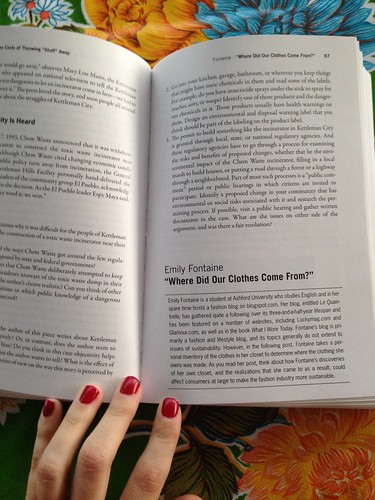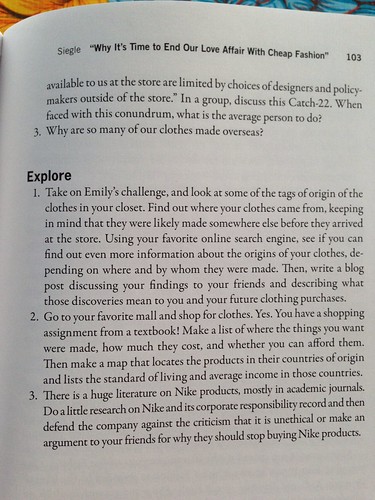Years always seem to split into two, and by the time December rolls around, looking back on things that happened in January and February seem as far away and foreign than if they had happened the previous year. This was especially true for 2014. The first part of the year feels like it happened in a completely different decade than the last half. The first five months or so were good; I was working a lot, exercising almost daily, really focusing on myself and my relationship with God and I felt like I was in a good place. But then over summer, right around the half-way point in the year, things changed. I got a promotion at work. And while this should have been the pinnacle moment of the year, something I had been waiting for for the last 3 years, it turned out to be quite the opposite. This made the last part of the year go to the birds. It's like I completely checked out. I spiraled into a hole that I'm still trying to climb my way out of. With the promotion came idleness, confinement, and weird hours, and it knocked me off the steady foundation I had created of busyness and routine. Looking back, this event taught me a lot about myself.
I always thought that I was a person who didn't like routine and the idea of being a slave to a set schedule, but not until I settled into one did I realize it was actually a perfect fit. I liked having the same hours everyday, not working an early shift one day and then a late shift the next and screwing up my sleep pattern. I liked getting up at the same time every morning, and actually being tired when I went to bed at night. And I liked knowing what to expect. Expectation, in a weird way, gave me freedom. I know this makes me sound old and boring, like routine automatically equates to a dull and stagnant life, but I really can't think of anything more exciting than being fully prepared and present for the day because you're comfortable and well-rested.
The next thing I learned is how much keeping busy helps me. Albert Einstein's words ring true, "Life is like riding a bike, to keep your balance, you must keep moving." In my prior position I was constantly physically doing something--walking around, doing different tasks, keeping myself busy. Not a busy that was exhausting or unhealthy, but one that kept me occupied enough not to get trapped inside my own thoughts. And one that wore my body out enough that I wasn't physically capable of keeping myself up at night with incessant thoughts and worries. This also spilled over into my everyday life and I found myself being more productive outside of work. Because I was used to it, it wasn't as hard for me to do. After I stopped being able to be busy at work, and with my hours cut to where I was at home all day until I had to work at night, I found myself slipping back into the idleness. And you know what they say, "idle hands are the devil's workshop."
The last thing I learned from this particular event is how much I crave being outside. My previous position allowed me to be outside a lot, by myself, walking around, taking in the sky and the trees and the fresh air. Now I'm stuck inside all day. I try to go outside on my breaks as much as possible to keep sane. This isn't just at work either. If I've spent too long inside my house, I make it a point to at least walk into my backyard and watch a sunset or take a couple breaths of fresh air. A couple days ago I was sitting in the car waiting for my mom and sister to get done in a store, having an underlying feeling of anxiety that, while common for me, is still uncomfortable. And as I sat with the feeling of dread, I looked out the window and saw these clouds that were illuminated by the late afternoon sun and trees gently rustling in the breeze and my heart filled up with so much joy I thought it could burst. And I laughed at the simplicity, that even in a moment of uneasiness, how much the beauty of the outside world soothes my nerves.
These are all things that I write for myself to remember. (I've also learned this year that if I don't write things down, I tend to forget them--this goes from grocery items to things I've been taught to deal with my anxiety that I forget in the moments I need it.) But I also want to acknowledge the moments throughout the year that I look back on fondly, like the day, pictured above, when I went hiking with my dad. We talked about God and birds and I learned that even amidst rocks and weeds poppies still grow. Or something as simple as going shopping with my mom and just being content. I'm thankful for all the people I've met this year-- people who make me laugh and think and challenge me.
I've learned more than anything that I am a person who loves the process, maybe even more than obtaining the goal itself. Like how sometimes getting ready is more enjoyable than going to the event, or the car ride more fun than the destination. This became clear to me when I got to where I thought I wanted to be, and realized it wasn't what I really wanted at all. It was the working towards something that I wanted, the possibility of something that made everything I did to get it seem worthwhile, even if it was unpleasant. Like Freud said, "In hindsight, the years of struggle will strike you as the most beautiful." It's in the struggle, in the process, where the pockets of calm and peace hold their sweetness. The moments of solace hold deeper meaning and are treasured more than anything else. And those were the best parts of 2014 for me. I'm excited to see, not what goals I can reach, but what process is in store for 2015, and how I will change and grow from it. And how many sweet spots of serenity it holds for me along the way.
Happy New Year.











